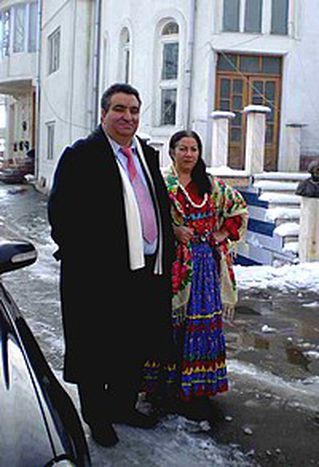
Gypsy king: 'The EU offers new hope for the Roma'
Published on
Translation by:
 melanie cutler
melanie cutler
Florin Cioaba, 'Roma King,' wants to unify the fragmented ethnic gypsy tribes and represent them politically
There are around 12 million Roma living in Europe today. Bulgaria and Romania’s accession to the EU brings them more power and a voice in Brussels. Florin Cioaba, who lives in Sibiu, believes that the EU represents an immense opportunity for his people.
How did you inherit the title of 'International King of the Roma?'
The Cioaba family has been at the head of the Roma for several generations. It was my father, Ion Cioaba, who tried to integrate the Roma into society on a national and international level in the 1960s. At the beginning of the 1990s, the Roma wanted a king to represent them and fight for their rights. My father went from being called 'Bulibasha', which means head of a tribe in Romani, to 'king'. Following his death in 1997, I inherited the title.
What could change for your people with Romania’s accession to the EU?
The EU has been changing the fate of the Roma in Europe since 2000, when the European Roma and Traveller’s Forum was started. This is a sort of ‘mini parliament’ that I belong to, as Vice President of the Romani Union. I see the EU as a new path and a new future.
Where exactly do the Roma need immediate support?
No single European state has legislation for discrimination of the Roma. Yet we are discriminated against everyday, especially on a local political level. The latest EU report recognises this as an increasing trend. This causes me concern, as well as the provision of health care and the housing situation of the Roma. Something urgently needs to happen.
What are your precise demands?
Every European country follows its own strategies. We also have one in Romania that has been partly implemented: Romani is taught in a few basic primary schools and at a Bucharest university. However, it is often the case that the programmes offered by the EU aren’t carried out. It's just not popular with the majority of the population.
The Romanian majority of the population complains that your customs are not compatible with a modern EU, for example, the practice of child marriage.
We want to hold on to our age-old traditions. In comparison to those, the European Union is very young! Now we find ourselves in a new millennium, and most recently in the EU, some things, of course, must change and I completely agree with that.
But changes shouldn’t be rushed and shouldn’t take place with the police standing at the doorstep. Around the topic of child marriage, there has been informational campaigns and many have already understood that children shouldn't get married at such a young age.
You personally had to be answerable to the European Parliament when your 13-year-old daughter, Ana Maria, got married.
My case was somewhat more delicate. The BBC was lying when it reported my daughter was forced into marriage with beatings and threats. And when Emma Nicholson (British MEP and Rapporteur for Romania) rushed to my daughter, that was correct. That is her role.
But when I explained to her that a centuries-old tradition demands from us Roma that our daughters should marry at this age, she understood and I also understood something. My daughter separated from her husband-to-be and they married once she had turned 15 (which is the Romanian legal age of consent for sex.)
How do you intend to bring the different interests of the various tribes of your people under one roof?
That’s my biggest concern. When my father founded the Romani Union straight after the revolution, at the start everyone joined. However, after a few months the union started to disintegrate with members absconding to other parties or unions. But 16 years later we can count over 250 Roma organisations in our country. At the moment I am trying to organise a single, uniform representation of the Roma. But it’s obvious that it will last at most to the next elections!
In Romania there are two different ideas on integrating the Roma. One demands strengthening this ethnic minority through its own schools. The other wants to see the Roma treated in the same way as Romanians. Which opinion do you hold?
In comparison to earlier, the Roma are already well integrated into Romanian society. We have university professors, we have our newspapers, and we have representatives in government. The Roma don’t need money or theoretical integration programmes from the EU, but need job creation strategies. There is a lack of jobs with which the Roma can pursue their centuries-old trades.
My vision is that tinkers will have the opportunity to develop themselves into the best worldwide copper workers, likewise for silver and goldsmiths. In my opinion, you have to give people a fishing rod and hook. If you give them a fish, then they will just expect to get more. If you give them a rod and hook, they will catch their own fish.
Translated from „Die EU ist eine neue Hoffnung für die Roma“


